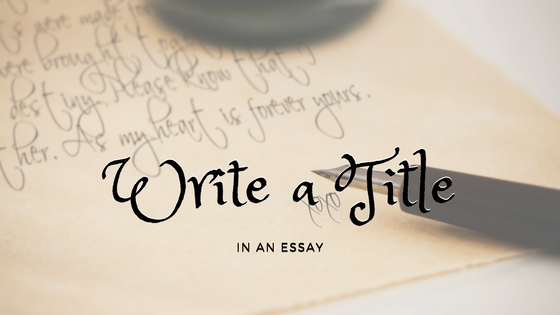Mar 30 2018

When students write essays and papers, they may spend quite a bit of time coming up with catchy titles, so that they can grab the attention of a reader. This is what they are taught in English composition classes, and the advice is real.
How to Come Up with a Title for an Essay
If you are not a creative person who can generate great essay and paper titles, you are in luck. Unlike students in past years, you have digital help on your side. If you are seriously challenged for titles, there are free online title generator tools. While they have been created to help bloggers come up with great titles, anyone struggling with them can get great ideas from these tools.
There is Another Issue with Titles – Other People’s, That is
When you are writing essays and papers, you will often refer to books, plays, articles, poems, etc. that have been a part of your research or that you wish to refer to in some capacity. In these cases, you will need to know how to write a title in an essay. Yes, it’s important, and professors can be pretty picky about how that is done. How you format titles is considered within the larger category of punctuation, and, depending on the type of work you are referencing, a title may be in italics, maybe in quotation marks, or may be left in regular type with no enclosing punctuation
So, here is a little guide about how to format titles of other authors’ works if you include them in the text of your essays and papers.
How to Format a Book Title and Other Works – Italicized
The following referred to works must be italicized:
- Books
- Blogs (not individual posts, but the blog itself)
- Cartoons and Comic Strips
- Journals (Magazines)
- Music albums and Compositions
- Legal Cases
- Newspapers
- Operas, Movies, Television Shows, Plays
- Online Databases
- Websites
- Long Poems
Works that Require Quotation Marks
Place quotes around the following works:
- Individual Blog Entries
- Episodes of a TV series
- Essays
- Photographs
- Articles in journals, newspapers, magazines, or encyclopedias
- Blog Chapters
- Short Stories
- Short Poems
- Songs
- Any Unpublished Manuscripts
- Speech Titles
Items that Need No Special Punctuation
- Biblical Scriptures
- Sections, Chapters, etc. from other Spiritual Works
- Awards
How to Write a Poem Title in An Essay
This is one gray area that leaves some room for flexibility. Long poems, as indicated above, should be italicized. For example, long epic poems, such as The Iliad, or Paradise Lost, should be in italics. Shorter poems, such as, “Anabelle Lee” by Poe are simply enclosed in quotes.
Inserting Works is Not the Same as Citations
Citations are used to provide credit to authors whose words or ideas you incorporate into essays and papers you write. Fortunately, students today have access to tools where they can make citations for free. You simply enter the bibliographical information and the format style that is required, and the tool will create it for you. Be thankful. Students in years past had to do this all by hand.
It’s the Details that Can Lower a Grade
A lot of students are irritated with all of the details of scholarly writing requirements, especially in-text end-of-text citations and references to works within the context of their writing assignments.
We understand the frustration. Yet many instructors and professors are rea “sticklers” for those details and will actually lower grades if everything is not according to accepted or required formatting.
Students would be wise to pay attention to these details. One student recently had a paper lowered to an A- because he did not punctuate works correctly. There is really no need to ignore these details where there are plenty of online resources to tap into to get it all right.
Do yourself a favor. Pay attention to the details, and don’t let your grade suffer because you didn’t.
